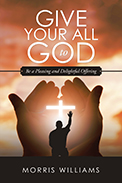
 |
According to the Bible, the ancient Israelites were given five principal means of making offerings to God. These were a sin offering, a trespass/guilt offering, a burnt offering, a meal/grain offering, and a peace offering. Such offerings often involved an animal sacrifice and always represented gratitude for blessings and the forgiveness of sins. Taking them as symbolic of what we can offer to God at all times, Williams suggests that we must put heart, mind, strength, soul, and body into our worship. Our legs carry us to good or bad directions. Our feelings, our hearts or “inwards” as Williams says, guide us to express compassion and help others. Our prayers can reach out to close ones as well as non-believers. We can sing to God, thank God, and obey God in all things. Such activities in our age replace the burnt sacrifices that God ordained for the Israelites.
Williams, a retired teacher who has dedicated himself to service to his church, demonstrates with evident enthusiasm the many ways in which we can “give our all” to the Creator, to our fellow human beings, and to Jesus, who gave his all for us. He delves deeply into what is meant by offering and sacrifice, translating those ideas into practical actions. Williams frequently quotes from the Bible and presents useful suggestions and food for thought—how to pray, the rewards of obedience, and what God learns about us as we react to “changing trials and temptations”—all with the intention of motivating us to seek, find, and exalt God in every life situation. He equates these efforts to the burnt offerings made by the Israelites, showing that we can consistently devote ourselves to God. Williams’ treatise is neatly organized with relevant references and could serve as a study focus for religious workshops.